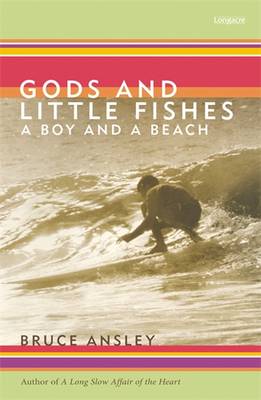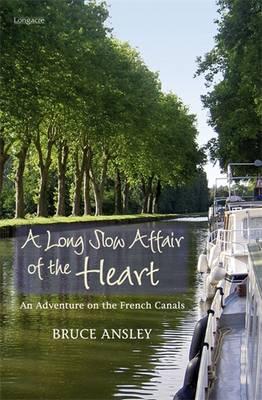Bruce Ansley
Bruce Ansley is a surfer, husband, father, adventurer, journalist and writer who felt so blessed by his seaside upbringing in New Brighton, Christchurch that he decided to write a book about it.
 Gods and little fishes: a boy and a beach features his family, his neighbourhood and his own viewpoint on growing up in New Brighton in the 1950s. For anyone who lives, or has lived, in this seaside suburb, Gods and little fishes is a hilarious journey. It explores the glory days of a generation growing up — a life filled with adventures, escapades (good ones and terrible ones), happiness and confusion, but above all, a deep sense of safety and security within the community.
Gods and little fishes: a boy and a beach features his family, his neighbourhood and his own viewpoint on growing up in New Brighton in the 1950s. For anyone who lives, or has lived, in this seaside suburb, Gods and little fishes is a hilarious journey. It explores the glory days of a generation growing up — a life filled with adventures, escapades (good ones and terrible ones), happiness and confusion, but above all, a deep sense of safety and security within the community.
Nicole Reddington talks to Bruce about writing and New Brighton.
On writing about New Brighton
New Brighton is perhaps not the most illustrious suburb that comes to mind for people when thinking of a setting for a coming-of-age memoir. However, this is more than one boy’s story. It is also the story of New Zealand. What happened in New Brighton happened all over New Zealand, but in spades
.
During the 1950s and 1960s, it was one of the most prosperous places in the country. Up until the 1980s, New Brighton was the only place in the country where shops were open on a Saturday and people came from everywhere.
It was great to be a businessman. It was even greater to be a child. With a playground that featured a pier, shops, a theatre, surf clubs and that crazy east-facing beach, there was no need to leave this sandy suburb. You could quite easily get an after-school job there.
Back then, children played outside unsupervised until tea was ready or it got dark. It is still a great place by the sea, but it is not as busy as it once was. Bruce says It was fun to live there, and it was fun to write about it. Where else can there be such a great resource just across the road that hasn’t been crowded out by developers?
New Brighton characters
There were many characters in New Brighton, making the social history of the area interesting and fun. Bruce still enjoys the company of several of the characters brought to life in his book. Down at the New Brighton Working Men’s club, the oft-mentioned haunt of his dad Hec (and subsequently Bruce himself), he realised he had talked to so many people about things that happened and still do happen.
During a conversation with Cocky (Alan Cockburn, fellow surfer and volunteer fire brigade stalwart, who ended up owning the family business, Gracies store) Bruce realised that he was speaking to a good friend who was the last of an era. He decided to take on the responsibility of writing about it. Preserving social histories and telling the stories are very important. They are very real, people can relate to them, or at least certain aspects of them and of course there is the historical element.
Importance of telling the stories
Books that rely on memory are not always historically accurate but Bruce says I was very lucky that I have a brother with a very sharp memory which enabled me to correct some points in this story.
His feeling is that the stories must be told, and it is definitely a celebratory and entertaining approach to history. Writing things down is really important at a personal level, but it is always a bonus if a certain number of readers are interested too.
Moving on from New Brighton
Half the people in this story still live in New Brighton. Bruce has moved up literally, although he is happy with the fact that he can still see New Brighton from his hill-side home which he shares with his wife of many years, Sally. Brighton beach used to be packed but it is not as busy as it once was
he says without the trace of disappointment that often accompanies such a statement. He is now closer to Scarborough beach where he surfs on his long-board, modelled on a ’65 Chev Bel Air.
Bruce enjoys a lot of travelling but always comes back. It’s a good place
he says. His children don’t feel the same sense of attachment. They now live in Auckland and Sydney, although one owns a restaurant here in town.
The end of the era
Bruce says things can get lost to time and technology. Things like a job that has a one-word description. He says growing up in the 50s and 60s, we were going to become lawyers or policemen or teachers and things like that. Now careers are described by a phrase and then people go and change them or mix a few things together after a few years anyway.
New Brighton was a very safe place to grow up in. Those attitudes have definitely changed now. And going to the local to have a drink with your Dad is now not the thing to look forward to when growing up. All the kids want to go to town.
On writing about people you know
 It can be hard writing about people. They don’t always like it. His previous book A long slow affair of the heart, features a journey that he and Sally undertook on the French canals (due in part to Bruce’s lifetime affair with boats). It ended up testing the strength of their relationship and he is mindful of how hard it is for Sally to have her private life revealed and that perhaps it might have been easier for her if he didn’t write it. Back in New Brighton, he did receive one response from a community member who thought he was a little hard on his dad Hec. That is a conversation that still needs to be reconciled.
It can be hard writing about people. They don’t always like it. His previous book A long slow affair of the heart, features a journey that he and Sally undertook on the French canals (due in part to Bruce’s lifetime affair with boats). It ended up testing the strength of their relationship and he is mindful of how hard it is for Sally to have her private life revealed and that perhaps it might have been easier for her if he didn’t write it. Back in New Brighton, he did receive one response from a community member who thought he was a little hard on his dad Hec. That is a conversation that still needs to be reconciled.
Honest storytelling
Bruce believes that life is full of stories and you really have to say everything. It doesn’t make sense just to pull out the sanctified bits. It won’t be reflective of the actual series of events or the people. That is also possibly the secret of being funny. The book is full of observations, relationships and humorous anecdotes, some of which are things that hopefully parents will never find out about. To leave them out would possibly leave some character’s sense of self-image intact, but then the story would never be told, to the detriment of the story itself, not to mention other characters.
Still enjoying New Brighton
There was a reunion party organised with the release of the book and people came from all over for a party that ended up lasting for three days and nights.
Bruce still visits New Brighton. He enjoys the occasional drink down at the Working Men’s Club, aware of the change on layout — now there is a jukebox where his father’s table was. A walk down the pier and a visit to the library are pleasures. Sitting in the New Brighton library listening to music on the headphones and enjoying the buzz, the background chatter and the comfortable seats with a view of a place which holds some wonderful memories, is something he cherishes.
On libraries
When pressed about memories of the library in New Brighton we hear of a very scary lady whose word was law
! Back then there was no television, so books were it. These days Bruce also enjoys the Central Library in town, the way groups and researchers use the place, and how they all seem to know each other. It is a vibrant and exciting place. The local public library is always on the ‘go to’ list of any new destination he and Sally might find themselves, along with wineries and anywhere else the local people find worth their while to be at.
How it all began
His writing career began more by accident than anything else. English was his best subject at school. The first real job began in Waipukurau when he got a job for the local newspaper. The first person offered the job turned it down, and to save on advertising they asked the next applicant who happened to be Bruce. Waipukurau was even crazier than New Brighton (who knows, there may even be another book in there).
Luckily for him, the editor was very good at his job and ended up growing that particular publication into something substantially more than the 4-page deal it once was. From these inauspicious beginnings, Bruce has worked as a journalist for newspapers and magazines and also as a scriptwriter with David McPhail on A week of it.
What’s next
Bruce is currently working on a book about the high country station Mesopotamia. He recently spent a week there, and it was bitterly cold. That experience gave him the understanding of just how hard it was for people living and working there. The ebb and flow of fortunes around there are indicative of the environment. He also had the good fortune to be working with Peter Bush, a photographer he admires very much and has enjoyed working with in the past.
Advice to young writers
His advice to upcoming writers, just write
. Writing is a verb. It’s no good having the story in your head. When you’re tired or pushed for time, just write something, it is better than nothing.
Find out more about Bruce Ansley and New Brighton
- New Brighton photos
- A selection of photographs from our heritage photograph collection
- New Brighton
- Books and other resources in our libraries about New Brighton
- Bruce Ansley’s books
- Books by Bruce Ansley in our libraries
- Surfing
- Books, magazines and DVDs on surfing in our libraries

